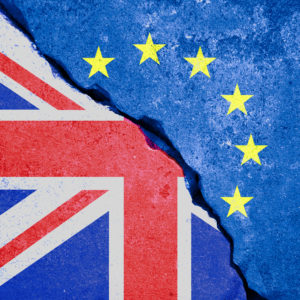Before Britain voted to leave the European Union, presumptive Republican presidential nominee Donald Trump waved off his own opinion about what’s become known as “Brexit,” saying he hadn’t given it much thought. After the vote, truly a historic moment for Europe and the world, Trump drew a bold, direct but ultimately implausible line between the vote he will face in November and the decision Britons made yesterday.
“They have declared their independence from the European Union and have voted to reassert control over their own politics, borders and economy,” Trump said from Scotland, where he was promoting a golf resort. “Come November, the American people will have the chance to re-declare their independence.”
At the level of broad brush strokes, it’s certainly easy to see some striking parallels between the sentiment that led to Brexit and the upsurge of frustration with traditional Republican that led to the presumptive nomination of Trump.
Critics of the EU played the immigration card, complaining they were a threat to the British way of life, and a drain on its finances. They decried a distant European bureaucracy, headquartered in Brussels. And they channeled a yearning for an undefined “Great” Britain, not unlike the Trumpian vow to return to when America was “great.”
Still, there are potent differences between the British referendum and the coming presidential election, most notably the politics of disaffected white voters, who can’t swing elections in 21st century America the way they used to. The lessons for former Secretary of State Hillary Clinton lie more in the way the pro-EU campaign read the tea leaves — wrongly.
For example, British disaffection managed to fly under the radar to a greater degree than pollsters understood.
There were signs throughout the campaign that British voters ready to cut ties with the EU didn’t always own up to that fact. Telephone polls frequently produced a better showing for the “Remain” faction than did online surveys, which voters answered in privacy, with no human interaction – not an unknown issue with candidate Trump.
The lesson for the Clinton campaign is that polls should be viewed with more than a touch of suspicion – maybe even paranoia – if they show the former secretary of state in the lead. It doesn’t necessarily mean the surveys are wrong in their overall conclusion, according to Brian Gardner, an analyst with Keefe, Bruyette & Woods in Washington.
“UK polls showed a close election for weeks,” Gardner wrote in a research note. “U.S. polls do not currently show a tight election here.”
Themes of a return to greatness, and a pointed disdain for outsiders, let British opponents of the EU garner more votes from older, white, less-educated voters and helped Trump defeat a small army of competing Republican candidates for president. But they worked with a broad, national electorate in ways that Trump will find hard to replicate in the United States.
One reason Prime Minister David Cameron’s epic gamble failed has to do with the anti-EU sentiment among the — white — working class base of the Labour Party.
The party overall has long been friendly to the EU, but Brexit supporters sliced powerfully into this voting base, in part thanks to the anti-immigration message they wielded, and in much the same way Trump outflanked Republican elites. That combined with the longstanding antipathy across a wide swath of Cameron’s Conservatives to create a solid 52 percent majority for the “Leave” camp.
Now, Britain is a multicultural society. Anyone who visits a major city can see that, and it’s a legacy of the British Empire. The descendants of Indians, Pakistanis, Caribbean islanders and plenty of other nations now count themselves British subjects.
But, according to the Runnymede Trust, a think tank focused on racial issues in Britain, ethnic minorities made up about 8 percent of the electorate in the country’s 2010 general election. By contrast, in this election, nearly a third of the U.S. electorate will be comprised of Hispanic, black, Asian or other minority groups.
This change represents “profound U.S. demographic shifts that are projected to continue for decades to come,” according to Jens Manuel Krogstad, a researcher with the Pew Charitable Trust.
In other words, Brexiteers assembled a Britain-wide coalition with disaffected, older white voters. Trump could only do that at the level of the Republican Party. You can’t win a national election in the United States that way – there just aren’t enough white people around these days.

